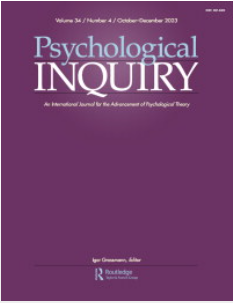People Who Need People
IF 4.1
2区 心理学
Q1 PSYCHOLOGY, MULTIDISCIPLINARY
引用次数: 0
Abstract
For years, my husband Jason and I would pack the kids into the car and set off for a monthly visit to my father-in-law’s house. The 45-minute route was the same every time. From experience, I knew when we exited the highway that we had 20minutes to go. When we passed the cow pasture, we were almost there. But to this day, I cannot tell you how to get there, and without GPS I would not be able to navigate there by myself. Why not? Because my Jason always did the driving. Milyavsky et al. (this issue) argue that when a goal can be accomplished by either personal or social means, more of one results in less of the other when “no alternative goals attainable by only one of the two contrasting means are active” (p. X). In other words, the more you accomplish the goal yourself, the less you rely on others to accomplish it, and vice versa. See Figure 1. For instance, the more Jason navigated to his dad’s house, the less I took responsibility for that task. In a goal hierarchy framework, my driving and Jason’s driving would be called equifinal—substitutable means to the same end. And in the simple scenario Milyavsky et al. (this issue) consider, there are no other goals competing for attention—no alternative goals, for instance, toward which Jason or I might devote effort. The logic of Milyavsky et al.’s (this issue) so-called “hydraulic relations” model (p. 1) is watertight. The inverse relations they describe should emerge in the closed, simple system I prefer calling the ceteris paribus scenario. When all other conditions remain constant, if Jason always drives me to my father-in-law’s, why would I ever offer to do it or learn how? And if instead I preferred taking the wheel, why would I ever ask for his assistance? And yet the ceteris paribus scenario is, I think, the exception rather than the rule. More often, we are animated by a much more complex system of dynamic, interactive goals and means. I call this more complicated and common scenario mutatis mutandis, meaning “things being changed that have to be changed.” As shown in Figure 2, in life there are four complications that contribute to a positive relationship between personal agency and social assistance: (a) personal agency can increase our desire to ask for assistance from others; (b) social support can increase personal agency; (c) sometimes what is required to reach a goal is the synergistic combination of both personal action and the assistance of other people; and (d) when other people help you solve a problem, your personal agency can be applied to an alternative goal that, like the original goal, advances a superordinate goal.需要帮助的人
多年来,我和丈夫杰森(Jason)会把孩子们塞进车里,每月去一次岳父家。每次45分钟的路线都是一样的。根据经验,当我们离开高速公路时,我知道我们还有20分钟的路程。当我们经过奶牛牧场时,我们就快到了。但直到今天,我还不能告诉你怎么去那里,如果没有GPS,我也无法自己导航到那里。为什么不呢?因为一直是杰森开车。Milyavsky等人(本期)认为,当一个目标既可以通过个人手段实现,也可以通过社会手段实现时,当“两种截然不同的手段中只有一种是有效的,没有其他可实现的目标”(第X页)时,一种手段的增加会导致另一种手段的减少。换句话说,你自己完成目标越多,你就越不依赖他人来完成它,反之亦然。参见图1。例如,杰森去他爸爸家的次数越多,我就越不愿意承担这个任务。在目标层次框架中,我的驾驶和杰森的驾驶被称为相同目的的等效替代手段。在Milyavsky等人考虑的简单场景中,没有其他目标争夺注意力——例如,没有其他可选择的目标,Jason或我可能会为之付出努力。Milyavsky等人(本期)所谓的“水力关系”模型(第1页)的逻辑是无懈可击的。他们所描述的反向关系应该出现在封闭、简单的系统中,我更喜欢称之为“其他条件相同”的场景。在其他条件不变的情况下,如果杰森总是开车送我去岳父家,我为什么要主动提出去做这件事,或者学习怎么做呢?如果我更喜欢开车,我为什么要找他帮忙?然而,我认为,其他条件相同的情况是例外,而不是规则。更多的时候,我们是被一个由动态的、互动的目标和手段组成的更加复杂的系统所激励。我把这种更复杂和常见的场景称为mutatis mutandis,意思是“必须改变的事情正在改变”。如图2所示,在生活中,有四个复杂因素有助于个人代理和社会援助之间的积极关系:(a)个人代理可以增加我们向他人寻求帮助的愿望;(b)社会支持可以增加个人能动性;(c)有时实现一个目标所需要的是个人行动和他人援助的协同结合;(d)当其他人帮助你解决问题时,你的个人能动性可以应用于另一个目标,像最初的目标一样,推进一个上级目标。
本文章由计算机程序翻译,如有差异,请以英文原文为准。
求助全文
约1分钟内获得全文
求助全文
来源期刊

Psychological Inquiry
PSYCHOLOGY, MULTIDISCIPLINARY-
CiteScore
10.30
自引率
1.10%
发文量
31
期刊介绍:
Psychological Inquiry serves as an international journal dedicated to the advancement of psychological theory. Each edition features an extensive target article exploring a controversial or provocative topic, accompanied by peer commentaries and a response from the target author(s). Proposals for target articles must be submitted using the Target Article Proposal Form, and only approved proposals undergo peer review by at least three reviewers. Authors are invited to submit their full articles after the proposal has received approval from the Editor.
 求助内容:
求助内容: 应助结果提醒方式:
应助结果提醒方式:


